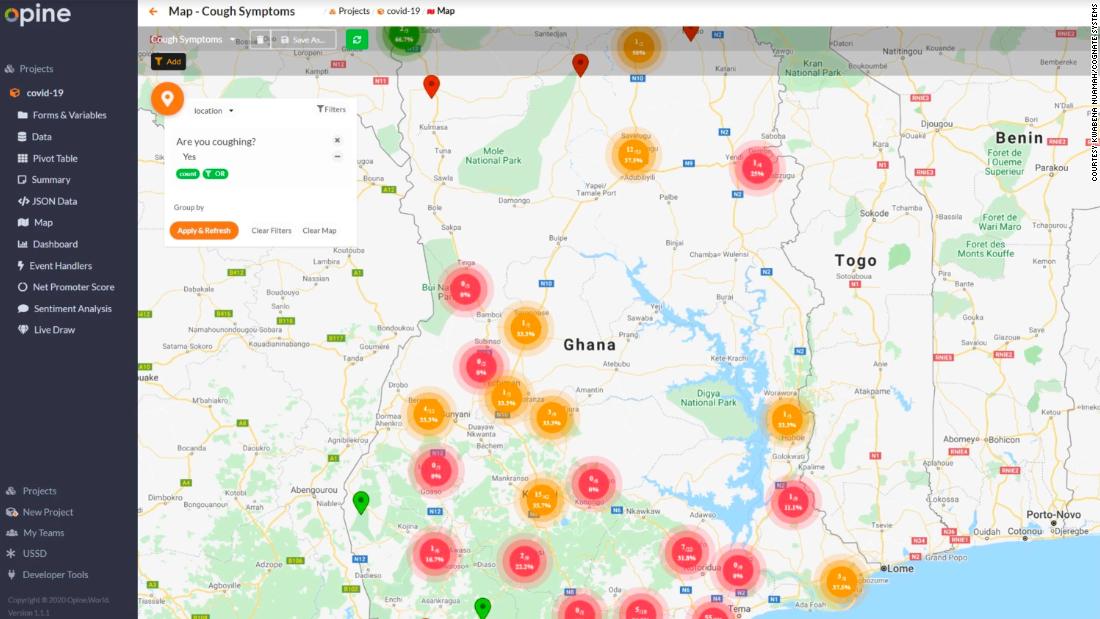
The Opine Health Assistant platform, launched March 26, collects information from residents about possible symptoms and the location of their coronavirus through a short USSD code, said Kwabena Nuamah, one of the founders of Cognate Systems.
When you dial a number that starts with * and ends with # to add credit to your cellphone or make a bank transfer, you use USSD.
“To use the platform, they must dial the short code * 920 * 222 # or * 714 * 444 # on their cellphone and then follow the instructions to answer questions about symptoms and other risk factors,” Nuamah told CNN.
“It’s free to use and users can use it on all types of mobile devices they have, even without credit,” he added.
They also asked if they needed important supplies such as food and shelter after the pandemic.
“When people fill out forms, with the information they provide us, we can analyze and estimate if the person is likely to be infected by a virus. We can also use their location that has symptoms to predict new areas that are likely to be exposed to the virus,” he said.
Data collected from USSD is built into the Opine Health Assistant, and information provided by the public about coronavirus is visualized on maps and graphs to make it easier to understand, monitor, and share.
Where does the data go?
According to Nuamah, the data collected will be shared with public health experts, data scientists, aid providers, and disease surveillance teams that are more suitable for understanding information and can use it to provide local solutions to the corona virus.
Nuamah ays Opine Health Assistant helps countries predict the possibility of the next high risk area for the virus, so it is better equipped to deal with a pandemic.
So far, 6,000 people have used it.
“We have seen several patterns over the last few days that we have launched. We have seen that the spread of the virus in Ghana is mostly in the Greater Accra Region and the Ashanti region,” he said.
“From the data we have obtained, we can see certain patterns to suggest that the eastern region will have the next case of the virus before it is reported. And almost 24 hours after predicting the spread of the virus in the region, around 16 reported cases reported there,” he added.
With that tool, he said, experts and disease control agents in Ghana can start preparing to contain coronavirus before hitting a particular region.
Providing important supplies
Opine Health Assistant also connects the public with agencies and non-profit organizations that provide important supplies and assistance materials.
Part of the data collected when filling out forms generated by the USSD code is information on where someone lives and if they need important items such as food and shelter.
“For people who might need food or shelter, in a series of questions, there is a section asking for their location. We provide locations to aid providers in our database such as churches and NGOs,” Nuamah said.
“If someone says he is in Accra, for example, and needs food. We share this information with aid providers in Accra so they can identify the people in the region and match it with supplies,” he added.
Nuamah said his team had contacted the Ghanaian government and one of their goals was to get the Ghanaian government to use their platform to identify the symptoms and hotspot of the coronavirus virus.
After the coronavirus pandemic, Opine Health Assistant will be used to monitor various diseases in Ghana, according to Nuamah.
“We are already thinking beyond the current pandemic. We want to, in the future, be able to tell what types of viruses are coming from different parts of the world. We don’t want to pursue cases after they occur, we want to be able to predict cases that come for various diseases.”







More Stories
Healing Streams Live Healing Services with Pastor Chris: Miracles Await this March 14th – 16th, 2025!
Essential Care for Hermann’s Tortoise: A Guide to Thriving Pets
Nail Decisions: Which is Better for You, Acrylic or Gel?